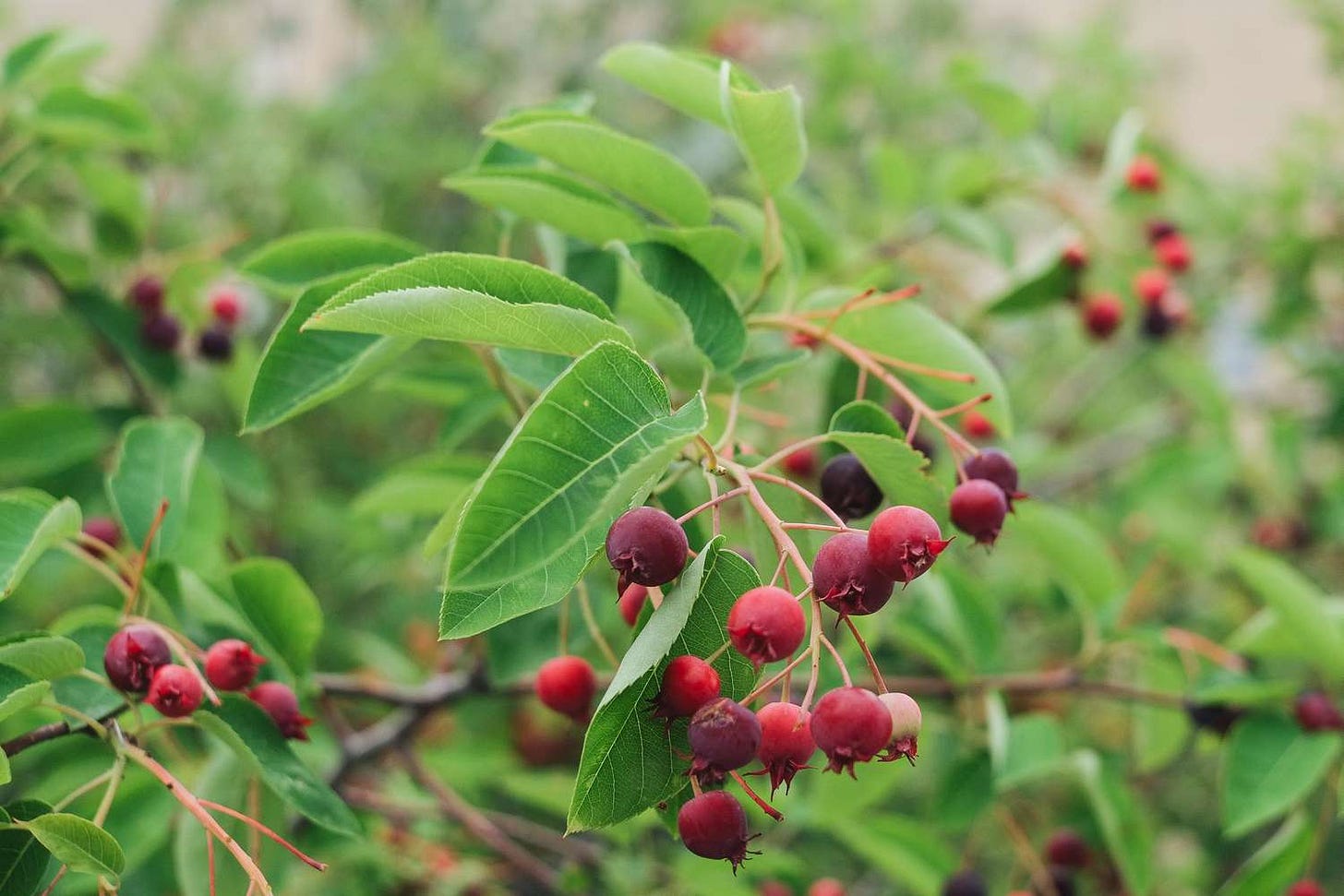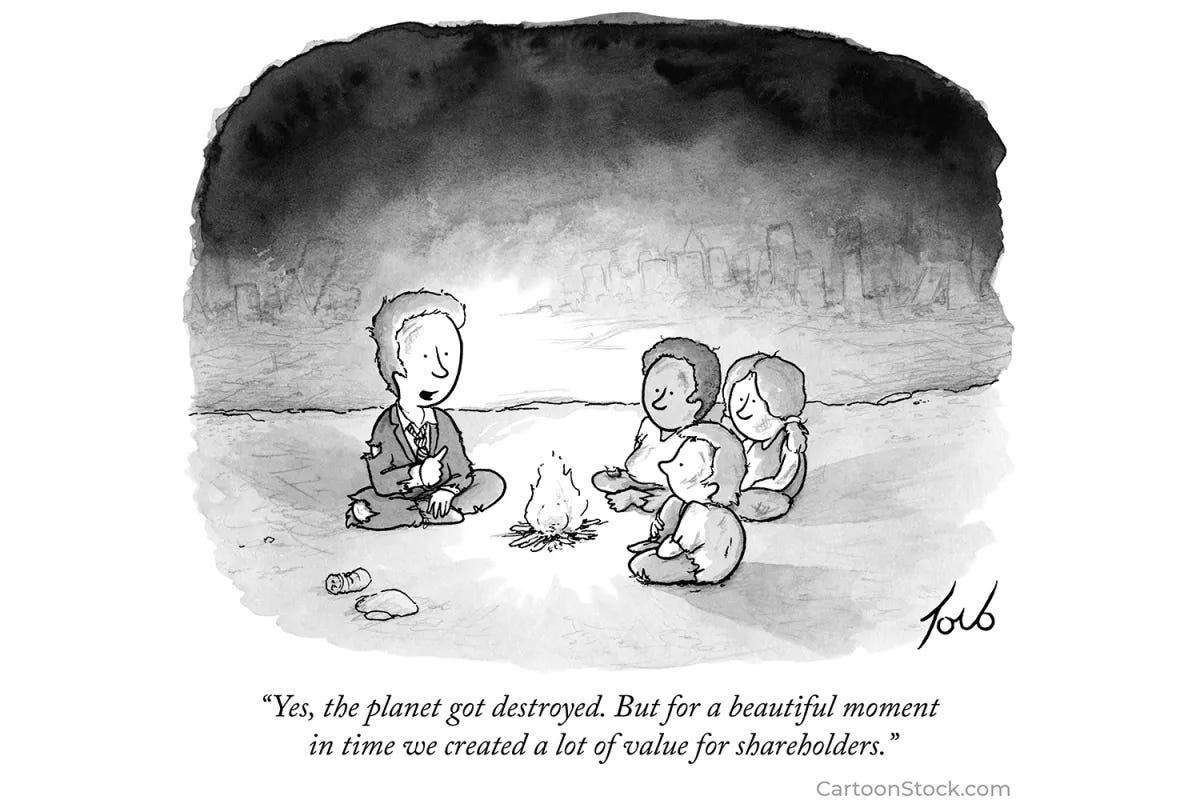Nothing reminds me of my limited days on Earth like reading books. There are too many books and far too many I'd like to read to accomplish in a lifetime. The only other thing that had me thinking about my end of days is when Theo ordered toothbrushes and we received over 200, reminding me that we might die before we use all of them.
What happens when I want to read too many books is that I wind up trying to read two books at once. I knew my interests were diverse, but this past month, I was reading The Serviceberry: Abundance and Reciprocity in the Natural World by Robin Wall Kimmerer at the same time as World For Sale: Money, Power, and the Traders Who Barter the Earth's Resources by Jack Farchy and Javier Blas. A couple of weeks in, I realized this combination was breaking my brain, but was also illuminating.
The World for Sale is about commodity traders. I have always been fascinated by commodities, which I would explain as the materials we extract from the Earth in massive quantities, that are traded around the world without regard for their origin, and are priced purely on the market. Commodity traders make money from what is called arbitrage, buying the product at one price and selling it at a higher one. Since the 1980s, commodity trading has become a financial instrument, wildly disconnected from the Earth, farmers, and the history of how those commodities came to be in the first place.
The book offered some incredible history of the earliest commodity traders, the tumultuous years of oil trading during the 70s and 80s, and their disregard for global norms and doing business with whoever they wanted (think Russia during the Cold War). If the world needs oil, heavy metals, wheat, etc., they argue it doesn't matter to them how it was extracted or grown; they are just the middleman.
The Serviceberry, on the other hand, is in direct conflict with how commodity traders think. The 112-page book is about how nature, and especially the serviceberry plant, offers a model for generosity and mutual flourishing, contrasting sharply with our scarcity-driven, competitive economy.
Kimmerer shows us so many examples of abundance in nature and gift economies. I felt a slight euphoria reading this book, imagining a world in which we didn't pillage for individual greed, but shared what we had.
I was once giving a lecture in a College of Natural Resources at a big, prestigious university. I took the opportunity to interrogate that name, because, after all, “natural resources” does mean raw materials to be converted into something we value. As it happens, that college was in the process of changing its name given its extratactive implications. So I offered a suggestion: “Why don’t you change your name to the Department of Earthly Gifts?
The disgust I felt in our capitalist, opportunistic, and colonialistic society made me put down the World for Sale. I know how that story ends. We keep extracting until we run out, perfectly encapsulated by this cartoon from the New Yorker.
So what happens when there are no more commodities to mine? If you have forgotten, oil is made from tiny marine organisms that died millions of years ago, sank to the seafloor, and were buried under layers of sediment. We will run out one day. And the food we grow depends on healthy soil that is eroding faster than it can be replaced.
We are trying to invent our way out of this, but we might not be able to do it fast enough. Then what?
I look to science fiction novels as potential futures, like Octavia Butler's Parable of the Sower, where humans must shape change consciously, together.
So while we wait to run out of extractive commodities, read The Serviceberry. Give a gift. Practice abundance.
As said best by Kimmerer:
I don’t think market capitalism is going to vanish; the faceless institutions that benefit from it are too entrenched. The thieves are very powerful. But I don’t think it’s a pie in the sky to imagine that we can create incentives to nurture a gift economy that runs right alongside the market economy. After all, what we crave is not trickle-down, faceless profits but reciprocal, face-to-face relationships, which are naturally abundant but made scarce by the anonymity of large-scale economics. We have the power to change that,to develop the local, reciprocal economies that serve the community rather than undermine it.
Gems of the Week ✨
Thank you
for keeping us up on the evolving food trends, including the increasingly bizarre protein-obsessed, which now includes a creatine cereal known as Man Cereal.What’s In That Dessert? Vegetables. Chefs are working with savory elements, herbs, and vegetables to keep the dessert course interesting
Do We Need Another Green Revolution? As the global population grows, we’ll have to find ways of feeding the planet without accelerating climate change. By Elizabeth Kolbert
Unpacking the Past (and the Groceries) With Your Therapist: Mental health professionals are meeting clients in the kitchen to harness the therapeutic powers of cooking.
- did it again with another viral, plant-based recipe, this time featuring beans! Her White Bean, Feta, and Quick-Pickled Celery Salad was quick to make and featured another underappreciated food, celery! It’s so crunchy and delicious. If your celery looks limp, place it in a bowl of ice water for 20 minutes, and it will come back to life.
Zucchini Ribbon Tostadas 🎀
Ingredients (for 6 tostadas)
6 tortillas
3 zucchini
1 can or 2 cups of cooked beans. (anything but white beans)
cumin
mozzarella
optional toppings: cilantro, chipotle mayo, pickled onions’
Instructions
Bake tortillas with a light brush of oil at 400 degrees, 4 min per side
Take your cooked beans and warm them up in some olive oil, add cumin and a splash of water. Mash until almost creamy
Thinly slice zucchini with a mandoline or peeler
Spread beans on crispy tortilla, top with torn mozzarella, and broil or bake for 10 min
Finish with cilantro if you have it








love witnessing you learn & read your books & take Ollie to the library
Great newsletter!